

José Antonio Ocampo: “Hay que romper las inmensas desigualdades” Recientemente, en Lima, se lanzó el Consenso Latinoamericano 2020 para suplir al liberal Consenso de Washington.
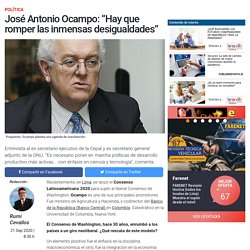
Ocampo es uno de sus principales promotores. Fue ministro de Agricultura y Hacienda, y codirector del Banco de la República (Banco Central) en Colombia. Catedrático en la Universidad de Columbia, Nueva York. El Consenso de Washington, hace 30 años, enrumbó a los países a un giro neoliberal. ¿Qué rescata de este modelo? Un elemento positivo fue el énfasis en la disciplina macroeconómica; el otro, fue la integración en la economía mundial, aunque con un sesgo, en el caso latinoamericano, hacia productos básicos. PUEDES VER Nuevo audio confirma nexos entre abogado de Karem Roca y Edgar Alarcón Usted, junto a un grupo de personalidades, lanzaron un Consenso Latinoamericano para suplir el de Washington. The Clash of Capitalisms. Capitalism rules the world.

With only the most minor exceptions, the entire globe now organizes economic production the same way: labor is voluntary, capital is mostly in private hands, and production is coordinated in a decentralized way and motivated by profit. Adopt a carbon tax to protect tropical forests. Deforestation must be stopped in tropical countries to tackle the existential threats of climate change and biodiversity loss.
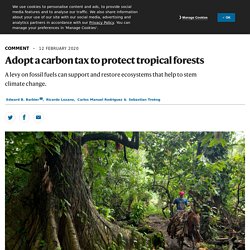
The vast majority of Earth’s species are in the tropics; forests there have taken in much of the carbon added to the atmosphere by human activities. Safeguarding these forests is central to slashing greenhouse-gas emissions and meeting the internationally agreed United Nations Sustainable Development Goals (SDGs)1. Sadly, in tropical countries and internationally, investments are woefully inadequate in conservation, restoration and improving land management to protect biodiversity and ecosystem services — collectively called ‘natural climate solutions’1,2.
After COVID-19, green investment must deliver jobs to get political traction. The most precipitous contraction of the global economy in a century has seen carbon emissions plummet.
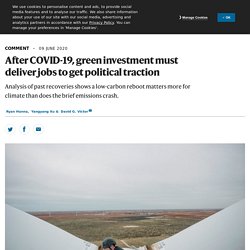
By the end of this year, emissions are likely to be 8% less than in 20191 — the largest annual percentage drop since the Second World War (see go.nature.com/3gej8th). To avert a global recession, governments are injecting trillions of dollars into stimulating their economies. Reset Sustainable Development Goals for a pandemic world. As COVID-19 batters the world and its economy, it’s time to rethink sustainable pathways for our planet.
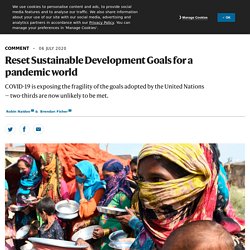
Rosy hopes that globalization and economic growth would bankroll waves of green investment and development are no longer realistic. It’s unlikely there will be enough money or attention to banish poverty and inequality, expand health care and overturn biodiversity loss and climate change, all by 2030. The SARS-CoV-2 virus has already killed more than 512,000 people, disrupted the livelihoods of billions and cost trillions of dollars. A global depression looms. World Economic Outlook Update, June 2020: A Crisis Like No Other, An Uncertain Recovery. Read full report PDF Dowload the Data Global growth is projected at –4.9 percent in 2020, 1.9 percentage points below the April 2020 World Economic Outlook (WEO) forecast.
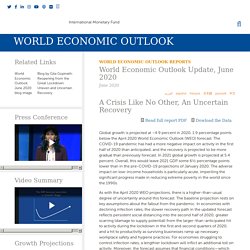
The COVID-19 pandemic has had a more negative impact on activity in the first half of 2020 than anticipated, and the recovery is projected to be more gradual than previously forecast. In 2021 global growth is projected at 5.4 percent. Políticas (industriales) productivas, por Marco Kamiya* Columnistas. La política industrial está siempre en debate, puesto que no hay país que logre el desarrollo sin empresas modernas y sólidas.
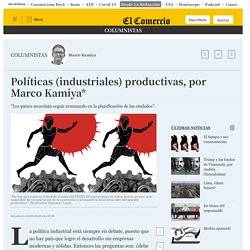
Entonces las preguntas son: ¿debe el Estado intervenir en la economía? Import dependence on essential medical goods during a pandemic. The ongoing COVID-19 pandemic has led to a massive increase in the demand for essential medical equipment to combat the spread of the disease.
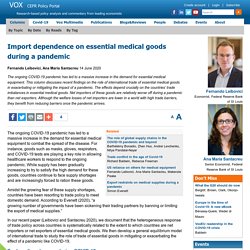
For instance, goods such as masks, gloves, respirators, and COVID-19 tests are playing a key role in allowing healthcare workers to respond to the ongoing pandemic. While supply has been gradually increasing to try to satisfy the high demand for these goods, countries continue to face supply shortages and are increasingly forced to ration these goods. Amidst the growing fear of these supply shortages, countries have been resorting to trade policy to meet domestic demand. ComexPerú - Sociedad de Comercio Exterior del Perú. En el Semanario 1025, señalamos que en el primer trimestre de 2020 las exportaciones peruanas disminuyeron un 15.8% respecto de dicho periodo en 2019.
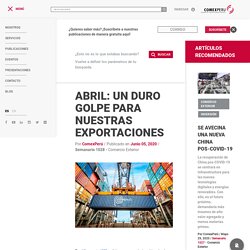
No obstante, es claro que esta caída fue un reflejo parcial de los efectos de la COVID-19, dado que solo incorporó el cese de actividades en la segunda mitad de marzo. Ya con cifras de la Sunat al mes de abril, tenemos una imagen más real del enorme shock que la pandemia supone para nuestro comercio exterior. Así, en el periodo enero-abril, las exportaciones alcanzaron un valor de US$ 11,383 millones, es decir, una caída del 22.3%; mientras que solamente en abril esta fue de 54.7% con respecto a abril de 2019 (en marzo, las exportaciones cayeron un 38.7%).
JPM barely wins climate vote; coal by any other name; UK retrofitting; Citi launches ESG group; Spain’s green recovery. Maintaining the Strength of American Capialism Can Innovation Policy Restore Inclusive Prosperity in America. A dangerous gap - The market v the real economy. Editor’s note: The Economist is making some of its most important coverage of the covid-19 pandemic freely available to readers of The Economist Today, our daily newsletter.
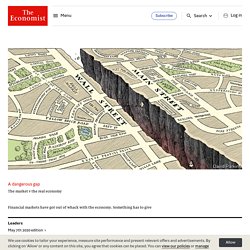
To receive it, register here. For our coronavirus tracker and more coverage, see our hub STOCKMARKET HISTORY is packed with drama: the 1929 crash; Black Monday in 1987, when share prices lost 20% in a day; the dotcom mania in 1999. With such precedents, nothing should come as a surprise, but the past eight weeks have been remarkable, nonetheless. Monopolies cost Americans $300 a month. We're no longer the land of free markets. When I landed in Boston in 1999, the United States was the land of free markets. Many goods and services were cheaper here than in Europe. Twenty years later, American free markets are becoming a myth. Internet service, cellphone plans, and plane tickets are now cheaper in Europe and Asia than in the US. Hbr. The Covid-19 pandemic has raised a critical question: Why does the United States not have the capacity to manufacture many products for which there is a sudden urgent need — everything from critical care ventilators, N95 face masks, and personal protective equipment to everyday items like over-the-counter pain relievers?
Of course, the United States is still a manufacturing powerhouse in many sectors, but it surprises many people that a huge number of everyday basic items have to be imported. Coronavirus crisis will send globalization into reverse. With each passing day the economic severity of the coronavirus crisis grows clearer. A global recession is now certain, along with crunching falls in trade. Ironically, many of the Asian nations that responded most effectively to the pandemic are now likely to be hit hardest by its fallout: it will hasten decoupling between the U.S. and China and accelerate the collapse of the trade-dependent model of globalization upon which so many Asian economies rely. The pandemic is creating an unusual simultaneous supply and demand shock to the world economy. Early on the former looked most problematic as factory disruptions in China rippled through supply chains.
But as the crisis intensifies the demand shock will matter more. The big industrial economies already affected account for well over half of world gross domestic product. Thomas Piketty Goes Global Speaking in 1918, with Europe ravaged by the horrors of modern warfare and Russia in the hands of the Bolsheviks, Irving Fisher warned his colleagues at the annual meeting of the American Economic Association of “a great peril.” That peril, which risked “perverting the democracy for which we have just been fighting,” was extreme inequality. “We may be sure that there will be a bitter struggle over the distribution of wealth,” Fisher, perhaps the most celebrated economist of his day, maintained. Thomas Piketty Goes Global The little guy’s guide to the world economy. The Passion Economy: The New Rules for Thriving in the Twenty-First Century by Adam Davidson, Alfred A.
Knopf, 2020 One of the difficulties of reporting on business is turning observation into actionable advice. Adam Davidson, a writer for the New Yorker and a creator of NPR’s Planet Money podcast, is one of the most perceptive explicators of the modern economy for nonexperts. Having first come to prominence during the 2008 financial crisis, reporting on the imploding economy, Davidson has written a lot about things that go wrong. Fed-Driven Asset Price Inflation Means You Can Now Buy Less House Than You Could Before - Analysis - Eurasia Review. By Thorsten Polleit* Wherever you look, prices for consumer goods, real estate, stocks, and bonds are on the rise. That means that the purchasing power of money is on the decline.
For if, say, stock prices go up, your money unit can buy fewer stocks. What it also means is that although people holding assets, whose prices increase, become “richer,” people holding money get “poorer.” 5G Explained – Part One. With indexes and stewardship, BlackRock pledges to retool passive investing for climate action. ImpactAlpha, Jan. 14 – Sustainability, and in particular climate risk, is disrupting asset management. “In the near future, and sooner than most anticipate, there will be a significant reallocation of capital,” BlackRock’s Larry Fink writes in his annual letter to CEOs. Fink put climate at the center of changes in the way it will manage the $7 trillion in assets in its care. The reforms reflect the pressure BlackRock and other major asset managers face from large institutional asset owners – and in particular the world’s largest, Japan’s $1.7 trillion Government Pension Investment Fund – which increasingly see global warming as a systemic risk to financial markets worldwide (see, “Universal owners push asset managers to push corporations toward sustainability in 2020”).
The Origin of Populist Surges Everywhere - the code economy - Medium. Winners of the UK Social Enterprise Awards 2019 » Social Enterprise UK. (106) Moral Money special edition: Ford Foundation’s Darren Walker on reforming philanthropy, capitalism and technology. Nobel Laureates Esther Duflo and Abhijit Banerjee on How to Lift People Out of Poverty. Home - Economist Intelligence Unit. Is Stakeholder Capitalism Really Back? by Joseph E. Stiglitz.
Globalcomex021. De promesas a resultados en el comercio internacional Lo que la integración global puede hacer por América Latina y el Caribe. Weekly global economic update. Beyonddisruption chapter 2. Crypto Traders Rushing to Digital Gold Coins Leave Bitcoin Behind. Business, society, and the future of capitalism. Capitalism has served us enormously well. Cryptocurrency News: Fed Debates the Creation of Its Own Digital Currency. ¿Cuáles son los principales sesgos que influyen en la toma de decisiones? Doing Business in Peru - World Bank Group. Gold Demand Trends Q3 2019. Trade losses for the US, China mount into tens of billions of dollars. MiddeClassSqueeze. Gobierno envió al Congreso el TPP para su ratificación. Chile o la eterna dependencia del cobre. Crony Capitalism: Inefficient, Unjust, and Corrupting.
Globalization’s Wrong Turn. Our Irrational Anxiety About ‘Slow’ Growth. Desplome en ventas de litio golpea ganancias de chilena SQM; oferta seguirá impactando los precios. The Reasons Why China Buys U.S. Treasury Bonds. China’s GDP: The Costs of Omertà. 2 Charts That Show How China Is Pulling Out of the United States. The US-Canada fight over NAFTA and dairy exposes an inconvenient truth about free markets.
A Primer on Democratic Socialism – Economic Studies Group. Modern Monetary Theory Beginner’s Guide. Después del neoliberalismo by Joseph E. Stiglitz. - The Washington Post. A finance blog about private equity, commodities, and other alternative asset classes. Headlines about China’s weak growth are somewhat misleading - China’s economy. U.S. Trade Hawks Exaggerate China's Threat. Headlines about China’s weak growth are somewhat misleading - China’s economy.
What’s Wrong With Capitalism? The Blind Spot in the Trade Debate by Laura Tyson & Susan Lund. Publicaciones.
World Economic Outlook (October 2018) - Real GDP growth. The Road From Thatcherism by Paola Subacchi. Globalisation has faltered - The global list. THREAD: Charlie Brown is the middle class. Lucy is the GOP. The football is "trickle down economics. Here's a chart that shows you exactly when income inequality became a feature instead of a bug.… International Politics and Society - IPS. What is the Difference Between Inflation and Deflation? Impact Investing. Subscribe to read. Geoestrategia y panorama energético global. Por (*) Coronel José Pardo de Santayana. What the World's Leaders at the New Economy Forum Are Reading. 7 Threats to the Booming Economy: Alan Greenspan. VIDEO-2018-11-01-11-33-30. Subscribe to read. Reino Unido, entre el declive y el abismo. ON IMPACT PREVIEW. Meet the champions of global impact banking. Blockchain and cryptocurrency jargon buster. Sustainable Investing Strategies & Advice.
Why Amartya Sen remains the century’s great critic of capitalism. LatAm_ImpInv_Spanish_2016. US Wealth Inequality: Quantifying the Driving Factors. World Population by Income. The dollar’s international role: An “exorbitant privilege”? Social Choice and Social Welfare by Amartya Sen. Setting the Record Straight on Secular Stagnation by Lawrence H. Summers. A Better Bailout Was Possible by Rob Johnson & George Soros. The Makings of a 2020 Recession and Financial Crisis by Nouriel Roubini & Brunello Rosa. The Makings of a 2020 Recession and Financial Crisis by Nouriel Roubini & Brunello Rosa.
The world has not learned the lessons of the financial crisis - Has finance been fixed? Wipo pub gii 2018 intro5. The World Economy’s Urban Future by Parag Khanna. Looking Back at the Economic Crash of 2008. Indexology. Por qué hay 200 inversionistas de Estados Unidos que piden que Perú no sea admitido en la OCDE - BBC News Mundo. En qué beneficia a Colombia formar parte de la OCDE, el selecto club de países ricos en el que hasta ahora sólo había 2 naciones de América Latina - BBC News Mundo. 6 gráficos que explican el nivel de ingresos en los países de América Latina y cómo se comparan con el resto del mundo - BBC News Mundo. Los 3 países de América Latina en los que más ha aumentado la inversión extranjera (y por qué sigue bajando en la región) - BBC News Mundo.